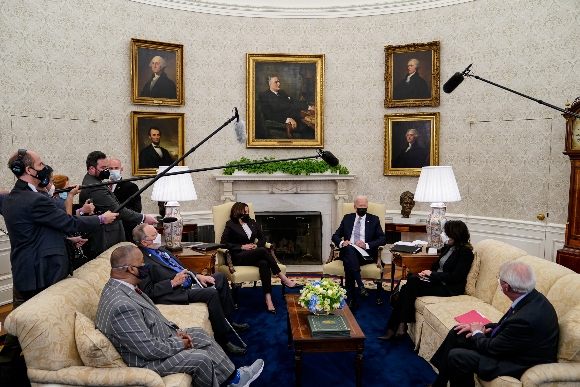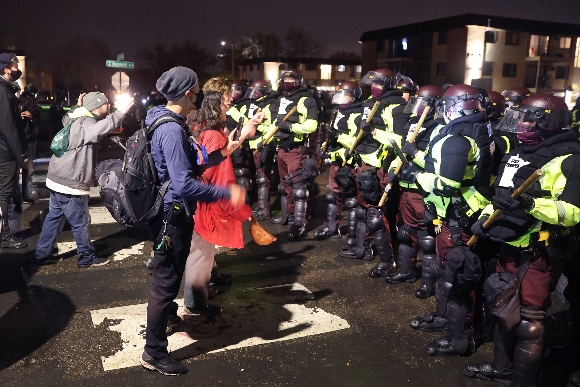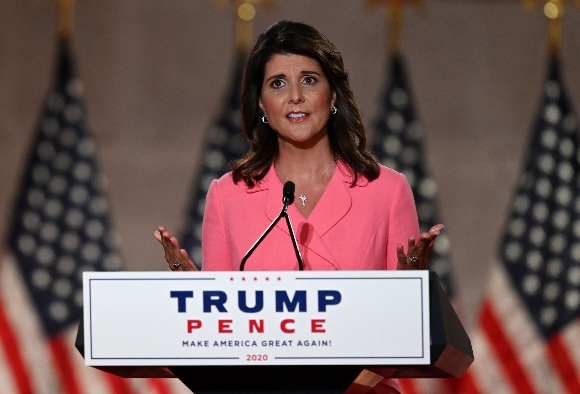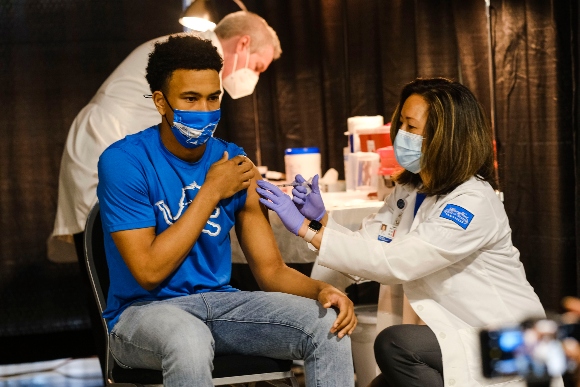The Hill’s Morning Report – Presented by Tax March – Biden, lawmakers start down a road with infrastructure

Presented by Tax March

Welcome to The Hill’s Morning Report. Today is Tuesday! We get you up to speed on the most important developments in politics and policy, plus trends to watch. Alexis Simendinger and Al Weaver are the co-creators. Readers can find us on Twitter @asimendinger and @alweaver22. Please recommend the Morning Report to friends and let us know what you think. CLICK HERE to subscribe!
Total U.S. coronavirus deaths reported each morning this week: Monday, 562,066; Tuesday, 562,533.
In the Oval Office on Monday, Republican lawmakers told President Biden that if he wants any Senate GOP support for infrastructure investments, he and fellow Democrats need to consider fewer federal dollars and a narrow definition for infrastructure and abandon the idea of raising corporate taxes.
In other words, everyone showed their opening bids.
Biden this week began a series of bipartisan meetings at the outset of an ambitious push for $2.35 trillion in spending for everything from roads and electric cars to new schools and senior living facilities. To cover the costs, Biden wants to hike corporate taxes.
A regionally diverse group of House and Senate lawmakers from both parties who know transportation and public works by virtue of their committee assignments and state experiences offered polite advice for an hour and 40 minutes without coming to consensus.
It was the start of a legislative process that will consume months and may result in politically tense adaptations in order to secure Democratic votes in the Senate, let alone any Republican support ahead of next year’s midterms.
“We agreed that roads, bridges, ports, airports, rail — those are all infrastructure,” Sen. Roger Wicker (R-Miss.), a member of the Senate Commerce, Science and Transportation Committee, told Fox News on Monday after a discussion in which four Republicans appeared to reject Biden’s inclusion in his plan of some health care benefits they see as a gift to labor unions. “The president was very engaged,” Wicker continued. “If he’ll scale it back, we may be able to [support the bill]. …There’s a lot of space between us.“
The Associated Press: Biden aims for bipartisanship but applies sly pressure.
The Washington Post: Biden insists he’s willing to negotiate with Republicans on infrastructure.
Wicker, like many of his GOP colleagues, balks at Biden’s interest in raising taxes to cover part of the price tag. “I did tell the president he has a very hard sell on raising the corporate tax rate, and I said that I viewed that 2017 tax bill as one of our signature legislative achievements. It’s probably the most important bill I have ever voted for, and I think it is responsible for us having 3.5 percent unemployment and really great economic news right up until the COVID-19 pandemic hit us,” he added.
Rep. Donald Payne Jr. (D-NJ), one of four Democrats in Monday’s meeting, said the president introduced the idea of raising the federal gas tax, which saw its last hike in 1993 and is not indexed for inflation, perhaps 5 cents per gallon to help pay for infrastructure. Payne said Biden indicated he’s also open to a user fee on electric vehicles, according to PBS.
Rep. Garret Graves (R-La.), who also was in the Oval Office, told reporters that next steps by the White House and Democrats will set the course for any potential deal with the minority.
“I certainly appreciated the words in the room, but obviously the follow-up actions are … most important,” Graves, a member of the House Transportation and Infrastructure Committee, told The Hill after the meeting.
As The Hill’s Mike Lillis, Scott Wong and Rachel Frazin write, the comments from GOP lawmakers suggest the degree of difficulty in achieving some semblance of bipartisanship. The $1.9 trillion stimulus package attracted zero GOP votes last month.
House Democrats want to pass a bill by the summer, with Memorial Day serving as an initial target date.
Cristina Marcos, The Hill: Five hurdles Democrats face to pass an infrastructure bill.
Politico: Biden woos GOP with sweet infrastructure words, but is it progress?
The Hill: The Biden administration on Monday released a state-by-state report card on infrastructure needs.
The Hill: Top Republicans on the House Ways and Means Committee on Monday raised concerns about the expanded child tax credit included as part of this year’s $1.9 trillion coronavirus relief law. Republicans say IRS advance payments of the credit could lead to an increase in improper payments to recipients.
The Hill: Senate Republicans open the door to encouraging each member to determine whether to embrace appropriations earmarks.

LEADING THE DAY
COURTS, POLICING, EXTREMISM: Overnight and into this morning, the death of 20-year-old Daunte Wright during a Sunday traffic stop in a suburb of Minneapolis sparked protests and some looting.
Biden on Monday had called for peaceful demonstrations, a full investigation and emphasized that looting was not appropriate following news of another young Black man killed by police, even in the midst of a searing trial of a white police officer charged with murder and manslaughter in George Floyd’s death last year (The Hill).
The president told reporters he had viewed video of Wright’s death from the police body camera and described it as “fairly graphic.”
“I think we’ve got to wait and see what the investigation shows,” he said at the White House. “The question is, was it an accident? Was it intentional? That remains to be determined by a full-blown investigation.”
Overnight, demonstrators clashed with police in Brooklyn Center near Minneapolis. Police attempted to disperse the crowd, which largely ignored police orders after Gov. Tim Walz (D) issued a dusk-to-dawn curfew (The Associated Press). According to reports, law enforcement fired tear gas, flash grenades and rubber bullets at protesters who refused to depart.
Minnesota State Patrol Col. Matt Langer told reporters at a late-night press conference that 40 demonstrators were arrested. He noted that some were taken to the Hennepin County jail while others were released. No protest injuries were reported.
According to Minneapolis Deputy Police Chief Amelia Huffman, four of 13 people arrested in the city itself were charged with looting (Minneapolis Star Tribune).
On Monday, the Brooklyn Center police chief announced that Wright’s shooting death had been an officer’s mistake when she believed she had reached for her Taser and instead fired her service revolver, killing Wright (The Hill). The officer was identified as Kim Potter, who has worked for the department for more than 25 years and is white (The New York Times). Potter is the president of the Brooklyn Center Police Officers’ Association. She has represented other officers in cases of deadly shootings (KSTP 5).
Wright’s death affected the Derek Chauvin trial as well as professional sports. The judge in the Minneapolis trial of the former police officer refused a defense request to immediately sequester the jury, which is now in its third week (The Associated Press). Jurors heard expert testimony that Floyd died last year from cardiopulmonary arrest brought on by low oxygen levels resulting from the position in which Floyd was restrained on the ground by police (The New York Times).
And MLB’s Minnesota Twins, the NBA’s Minnesota Timberwolves and the NHL’s Minnesota Wild all postponed Monday games, anticipating protests in the city.
The Hill: Deadly new incidents sharpen national tensions over policing and race amid the Chauvin trial.
Reuters: The Biden administration said it is backing away from a campaign pledge to swiftly create a U.S. police oversight commission, concluding that legislation would better address officers using excessive force, said White House domestic policy adviser Susan Rice in a statement.
Also on Monday, one unidentified male died and an officer was wounded during a Knoxville, Tenn., high school shooting about 180 miles east of Nashville, police reported. A suspect was apprehended (The Associated Press). According to the Knoxville Police Department, one of its officers sustained non-life-threatening injuries.

It is predominantly far-right extremists — white supremacists, anti-Muslim haters and anti-government groups — who are responsible for a startling rise in U.S. domestic terrorism, according to a Washington Post report drawn from data compiled by the Center for Strategic and International Studies.
*****
POLITICS: Nikki Haley, former U.S. ambassador to the United Nations and former South Carolina governor, said she will not seek the White House in 2024 if former President Trump decides to run.
When asked by The Associated Press if she would back Trump in 2024 if he ran, Haley responded in the affirmative.
“Yes. … I would not run if President Trump ran, and I would talk to him about it,” Haley said. “That’s something that we will have a conversation about, at some point, if that decision is something that has to be made.”
The former Palmetto State governor made the remarks following a tour of South Carolina State University in one of her first public events in months. They also represented her first extensive comments about Trump since she denounced his actions on Jan. 6 in a Politico Magazine story.
Haley added that she has not spoken to Trump since the insurrection at the Capitol.

The comments also come amid a delicate dance party leaders are doing in regard to the former president, with some fearing that he is driving an even deeper wedge into the GOP following his remarks at its spring donor retreat on Saturday.
Having focused predominantly on his grievances against political enemies and little on the 2022 midterms, Trump is offering Republicans few assurances that he is trying to unify the party riddled with internal divisions and mired in the minority in both chambers. As The Hill’s Max Greenwood writes, the remarks are a reminder of the high-wire act facing the GOP as it remains consumed with infighting in recent months.
The Hill: Senate Minority Leader Mitch McConnell (R-Ky.) on Monday sidestepped questions about Trump’s characterization of him over the weekend as a “dumb son of a b—-.” The senator, who has said he would support Trump for president if he’s the party’s nominee in 2024, will be asked by reporters about the comment again today.
The Hill: Former North Carolina Gov. Pat McCrory (R) set to launch Senate bid.
Politico: Meet Michael Wood, the Texas veteran who could blaze a trail for the anti-Trump GOP.
The Hill: Republican legislators target private sector election grants.
> Guns: Biden’s call for a ban on assault weapons puts pressure on Democrats in Congress to go beyond expanded background checks. But any roll call votes in an effort to reinstate a ban on assault weapons and to bar the sale of high-capacity magazines could be political liabilities in midterm elections in battleground states, including Georgia, North Carolina, Pennsylvania and Wisconsin, The Hill’s Alexander Bolton reports.
Niall Stanage: The Memo: How liberal will the Biden presidency be?
Reid Wilson: The Hill: Federal stimulus boosts Newsom ahead of recall.
IN FOCUS/SHARP TAKES
CORONAVIRUS: Centers for Disease Control and Prevention Director Rochelle Walensky called on Michigan to “close things down” again amid a surge of COVID-19 across the state.
Over the past month, few areas have been as hard hit as Michigan. Its daily infection count has increased seven times from its low point in cases in February (The New York Times). Michigan Gov. Gretchen Whitmer (D) has called on the administration to allocate more vaccine resources to the current U.S. hot spot, but Walensky pushed back on that idea, noting that any vaccinations that take place now would not have much effect for two to six weeks.
“When you have an acute situation, an extraordinary number of cases like we have in Michigan, the answer is not necessarily to give vaccines — in fact, we know the vaccine will have a delayed response,” Walensky told reporters (Axios).
“The answer to that is to really close things down, to go back to our basics, to go back to where we were last spring, last summer … to flatten the curve, to decrease contact with one another, to test to the extent that we have available, to contact trace,” Walensky said. “If we tried to vaccinate our way out of what is happening in Michigan, we would be disappointed that it took so long for the vaccine to work, to actually have the impact.”
As The Hill’s Justine Coleman writes, 20 hospitals in the state have surpassed 90 percent occupancy as the B.1.1.7 strain (commonly known as the United Kingdom strain) spreads throughout its cities. Whitmer has held off imposing new lockdowns as she gears up for a reelection campaign after facing intense criticism from residents last year.
The Wall Street Journal: U.K. strain doesn’t result in more severe COVID-19 among hospitalized patients, study finds.

With the lion’s share of attention on vaccines, progress is also being made on therapeutic treatments for COVID-19, albeit at a slower rate. On Monday, Regeneron announced that new results from a clinical trial found its antibody cocktail reduced the risk of symptomatic infection by 81 percent in people who were not infected at the start of the trial. The trial was conducted alongside the National Institute of Allergy and Infectious Diseases.
The company added that it is planning to ask the Food and Drug Administration (FDA) to allow the drug to be used as a preventive treatment for COVID-19. The drug was approved by the FDA for emergency use in late November (The Hill).
Reuters: AstraZeneca shot is good if safety issues can be overcome, Anthony Fauci says.
The Associated Press: Colleges divided over requiring student vaccinations.
The Hill: Florida reports single-digit COVID-19 deaths for first time in months.
CNBC: India overtakes Brazil to become the second-worst-hit country as COVID-19 cases soar.
*****
ADMINISTRATION: The conditions at the U.S. southern border continue to preoccupy an administration trying to manage multiple crises and conflicts at once. The White House on Monday announced new border agreements with Mexico, Honduras and Guatemala that call for those countries to step up a military presence at their borders in an effort to stem migration to the United States (The Hill).
The New York Times: Biden on Monday announced he will nominate Chris Magnus as commissioner of U.S. Customs and Border Protection, tapping a police chief from Tucson, Ariz., and a Trump critic to lead a major agency within the Department of Homeland Security (DHS). The president also plans to nominate Ur Jaddou — who previously served as director of DHS Watch, a project of the immigration reform group America’s Voice — as director of U.S. Citizenship and Immigration Services.
Israel is standing firm in its opposition to the U.S. vow by the Biden administration to rejoin the 2015 nuclear agreement with Iran. Mysterious back-to-back attacks on an Iranian nuclear facility and a critical military ship in the Red Sea raise concerns that Israel already is undertaking a kinetic campaign of sabotage against Tehran. Israeli Prime Minister Benjamin Netanyahu has repeated tough warnings that his country would not hesitate to eliminate Iranian threats to the Jewish State (The Hill).
The Hill: Biden will nominate Christine Wormuth to be the first female Army secretary. She was the under secretary for defense policy at the Pentagon during the Obama administration and served on Biden’s defense transition team.
The Wall Street Journal: Biden intends to nominate two former National Security Agency (NSA) officials to high-level cybersecurity positions in the wake of two recent hacks linked to foreign governments. According to the White House, the president will nominate Jen Easterly, a former senior counterterrorism and cybersecurity official at NSA with experience at the Obama White House, to lead the Cybersecurity and Infrastructure Security Agency (CISA). CISA is an arm of the Department of Homeland Security responsible for election security and protecting civilian government networks from hackers, as well as securing the nation’s critical infrastructure from both physical and cyber threats. Chris Inglis, the former deputy director of the NSA, will be nominated as the first-ever national cyber director within the White House.
The president is preparing to name Republican Cindy McCain to be U.S. ambassador to the U.N. World Food Programme, the world’s largest humanitarian organization, based in Rome. It would be Biden’s first Republican appointee to a Senate-confirmed position. McCain, wife of the late Sen. John McCain (R-Ariz.), endorsed Biden in Arizona before he became the first Democratic presidential nominee to carry the state since former President Clinton in 1996 (Politico).
The Morning Report is created by journalists Alexis Simendinger and Al Weaver. We want to hear from you! Email: asimendinger@digital-stage.thehill.com and aweaver@digital-stage.thehill.com. We invite you to share The Hill’s reporting and newsletters, and encourage others to SUBSCRIBE!
OPINIONS
How F.D.R.’s heir is changing the country, by Jonathan Alter, opinion contributor, The New York Times. https://nyti.ms/3thwR62
Prince Philip is gone, just when America needs him most, by Gerard Baker, editor at large, The Wall Street Journal. https://on.wsj.com/3tdUXhY
A MESSAGE FROM TAX MARCH
FedEx made $1.2 BILLION in profits last year but paid NOTHING in federal income taxes. Now FedEx is trying to protect their tax breaks by lobbying against President Biden’s plan to create millions of jobs and rebuild America. Tell Congress: it’s time corporations like FedEx pay their fair share.
WHERE AND WHEN
The House meets for legislative work at 7 p.m.
The Senate will convene at noon and resume consideration of the nomination of Polly Trottenberg to be deputy Transportation secretary.
The president will receive the President’s Daily Brief at 9:30 a.m. Biden at 1 p.m. will pay his respects during a congressional tribute for Capitol Police officer William Evans as he lies in honor in the Capitol Rotunda following his recent death when a driver rammed him with a car outside the Capitol. At 2 p.m., Biden and Vice President Harris will meet with members of the Congressional Black Caucus in the Oval Office.
Harris will hold a 12:30 p.m. roundtable about Black maternal health. At 4 p.m. she will also offer her respects to the late Office Evans in the Capitol Rotunda.
The White House press briefing will take place at 12:30 p.m.
Economic indicator: The Bureau of Labor Statistics reports at 8:30 a.m. on the U.S. consumer price index in March.
INVITATION to The Hill’s Virtually Live three-day program “The Sustainability Imperative” from Wednesday through Friday. Join dozens of notable experts, leaders and stakeholders for eye-opening discussions this week, including White House climate adviser Gina McCarthy, former General Electric CEO Jeff Immelt, Oregon Gov. Jay Inslee (D), AFL-CIO President Richard Trumka, fashion designer Tracy Reese and many more. Information is HERE.
The Washington Post Live hosts a discussion about politics and the state of the GOP at 9 a.m. with Sen. Rick Scott (R-Fla.), the chairman of the National Republican Senatorial Committee. Information and live stream is HERE.
Hill.TV’s “Rising” program features news and interviews at http://digital-stage.thehill.com/hilltv or on YouTube at 10:30 a.m. ET at Rising on YouTube.
ELSEWHERE
➔ TECH: Amazon’s initial defeat of a union in Bessemer, Ala., is the latest in a string of victories for Big Tech companies over labor. The steep margin of victory is a setback for organizers who had hoped a win in Alabama could serve as a proof of concept for unionizing other warehouses, even though the result faces a credible challenge from the union. And as the wins for tech companies add up, future labor efforts may have to consider alternative strategies and hope for some help from Washington (The Hill).
➔ ADVOCACY & INFLUENCERS: The Center on Budget and Policy Priorities in Washington has a new president, Sharon Parrott. She spoke with The Hill’s Naomi Jagoda about the think tank’s next chapter.
➔ HELP WANTED: A growing number of small businesses, primarily restaurants, are having trouble finding workers amid a pandemic that forced millions of Americans into unemployment. While some business owners and analysts say the federal government’s generous jobless benefits are to blame for a scarcity of certain types of workers, others point to COVID-19 and health concerns (The Hill).
➔ MAJOR TRAINING: Biden’s adopted German shepherd Major will receive “off-site” professional canine training after several recent biting incidents at the White House (The Hill).

THE CLOSER
And finally … The phrase “useless grass” caught our attention while reading about a Las Vegas woe among water-worried residents and businesses.
A desert city built on a reputation for excess and indulgence, including fountains and golf courses, wants to become a model for restraint and conservation with a first-in-the-nation policy banning grass that nobody walks on.
Las Vegas-area water officials have spent two decades trying to get people to replace thirsty greenery with desert plants, and now they’re asking the Nevada Legislature to outlaw roughly 40 percent of the turf that’s left (The Associated Press).
Officials assert there are eight square miles in the metro area of “nonfunctional turf” — grass that no one ever walks on or otherwise uses in street medians, housing developments and office parks. By ripping it out, they estimate the region can reduce annual water consumption by roughly 15 percent and save about 14 gallons per person per day.
“The scale of this is pretty unprecedented in terms of a full ban,” said John Berggren, a water policy analyst at Western Resource Advocates.

Copyright 2023 Nexstar Media Inc. All rights reserved. This material may not be published, broadcast, rewritten, or redistributed. Regular the hill posts









